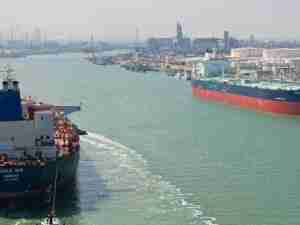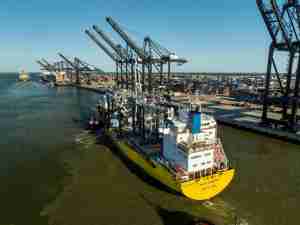The strike, in its second week, has curbed exports of metals, cars, fruit and wine to Europe and Asia as well as imports of vehicle parts and fuel supplies just three weeks before the start of the soccer World Cup in June.
Economists have estimated losses in the hundreds of millions of rand, but this could rise to billions if the strike dragged on, and it may take weeks to clear the backlog at the ports.
The strike has hurt global miners with operations in South Africa, forcing some to declare force majeure, and car makers -- a big employer and contributor to the economy -- warned they would shut their operations if the strike persists.
So far, coal exports to power plants in Europe and Asia have not been affected thanks to stocks at the ports, and fuel supplies to petrol pumps were also unaffected.
South Africa hosts the soccer World Cup next month, and FIFA said imports of some equipment for the event have been affected, but the country is bracing for more protests ahead of the event.
A strike by half of the workers at state owned power utility Eskom due to start on Wednesday could disrupt electricity supply in Africa's biggest economy, and embarrass President Jacob Zuma's government before the world's premier sports event.
Media reports said nearly one million South African public service workers, including nurses and teachers, may consider striking during the soccer event unless an independent mediator helps to resolve a wage dispute with the government.
The industrial action over the past few weeks has drawn criticism from economists and the central bank who say the workers are trying to hold the government and state enterprises to ransom by staging strikes close to the World Cup, to squeeze wage hikes, mostly above inflation of 5.1 percent.
They say this could hamper the economy's ability to continue its recovery from its first recession in 17 years.
The rand currency weakened against the dollar to a session low of 8.0220 before recovering to 7.9050 by 1355 GMT after the South African Transport and Allied Workers Union (Satawu) rejected the revised pay deal.
UNIONS SPLIT
The bigger union at the company, the United Transport and Allied Trade Union (UTATU), accepted Transnet's new deal, and said its members would report back to work on Monday.
"Satawu will continue with the strike even if Utatu has signed the deal," Satawu president Ezrom Mabyana told reporters. The union wants its members in other public enterprises to join their strike out of sympathy and to force through its demands.
Two-thirds of Transnet's 54,000-strong workforce have been on strike since early last week. The striking workers are under pressure from the government to end the strike, while the workers themselves are feeling the pinch because they are not being paid while on strike.
Anglo American Plc, Xstrata and the world's top steelmaker ArcelorMittal declared force majeure on the supply of iron ore, ferrochrome and steel respectively. Transnet also declared force majeure on coal destined for export. (Reuters)










